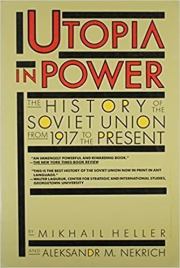Mikhail Geller - Utopia in Power
 | Название: | Utopia in Power |
Автор: | Mikhail Geller | |
Жанр: | Старинная литература | |
Изадано в серии: | неизвестно | |
Издательство: | неизвестно | |
Год издания: | 1988 | |
ISBN: | неизвестно | |
Отзывы: | Комментировать | |
Рейтинг: | ||
Поделись книгой с друзьями! Помощь сайту: донат на оплату сервера | ||
Краткое содержание книги "Utopia in Power"
From time immemorial history has been written by the victors. "Woe to the vanquished," said the ancient Romans, by which they implied not only that the vanquished may be exterminated or turned into slaves but that the conquerors write the history of their wars; the victors take possession of the past and establish their control over the collective memory. George Orwell, perhaps the only Western writer who profoundly understood the essence of the Soviet world, devised this precise and pitiless formula: "Whoever controls the past controls the future." Orwell was not the first to say this, though. Mikhail Pokrovsky, the first Soviet Marxist historian, anticipated Orwell when he wrote that history is politics applied to the past.
Читаем онлайн "Utopia in Power". [Страница - 5]
In order to harness the turbulent and unplanned process of industrial growth and to eliminate the bottlenecks that developed along the way, some structural transformations, some reforms, were needed. But Nicholas II had only one desire: to keep the country as he had found it upon his ascension to the throne after his father's death. All of the tsar's actions, and all of his inaction, were directed to this end. Shulgin has suggested an eloquent postmortem for the Russia of that time: "An autocracy without an autocrat."23
To the tsar's personal inaction was juxtaposed a tumultuous political area. "In 1917 there were political parties for nearly every social class," the Soviet historian Spirin notes—with some perplexity.24 It should be added that these parties had originated well before 1917 and that most of them functioned legally, with their own representatives in the Duma. The Bolshevik representatives, who openly called for Russia's military defeat, were not arrested until November 1914, and then exiled only after a trial.
By mid-1915 virtually all the parties in the Duma had gone into opposition. The Progressive Bloc, the core of the parliamentary opposition, was formed in August 1915. It included the Constitutional Democrats (Cadets), the Union of October 17 (Octobrists), the Progressives, and the Nationalists. The binding force in this coalition of liberals, centrists, and rightists (except for the extreme right) was the sole liberal party in Russian history: the Cadets. The Cadet program stressed that it was a party of all the people, not of one class, and that its highest loyalty was to Russia and a strong Russian state. The Cadets explained their role in opposition to the tsar by their desire to strengthen the state. To a large degree they defined progress as Russia's ability to defend its international position.
The Cadets proclaimed that "everyone without exception" should be subject to the rule of law and that "fundamental civil rights" should be guaranteed to all citizens. They called for the eight-hour day, trade union rights, and mandatory medical and old age insurance paid for by the state. They advocated distribution of crown lands and monastery lands to the peasantry and expropriation of the large landed estates with indemnification. Categorically opposed to federalism or any change in the political structure that might weaken the empire, they saw as their main task to prepare Russia for "a parliamentary system and the rule of law."25
The Cadet party's principal base was among those connected with the zemstvos, the institutions of local government introduced in the reforms of the 1860s. At the beginning of the war two empire-wide organizations, the Union of Zemstvos and the Union of Towns, were founded with the aim of involving the general public in the war effort, in cooperation with the government. The work of these organizations provided considerable scope for the expansion of the Cadets' influence.
The Octobrist and Progressive parties, also members of the Progressive Bloc, held liberal monarchist views. In allying themselves with the parliamentary opposition, they hoped on the one hand to help channel discontent and on the other to persuade Nicholas II to heed the warning voices and change the government, appointing ministers who would "enjoy the confidence of the nation."
The revolutionary parties, the Socialist Revolutionaries (SRs) and Social Democrats (Bolsheviks and Mensheviks), sought to combine revolutionary activity with legal opposition in the Duma. During the early years of the war, revolutionary agitation found little response among the people. Particularly unpopular was the Bolsheviks' slogan for a Russian defeat. The arrest of the participants in a Bolshevik conference in Finland in November 1914, including Lev Kamenev, who was presiding, and the party's other Duma representatives, deprived the Bolsheviks of their leadership inside Russia.
It was extremely difficult to direct a revolutionary party from exile. The Okhrana, the tsarist secret police, had infiltrated these parties with their agents and watched their every move. One agent, Evno Azef, dealt a particularly devastating blow to the SRs after becoming the head of its terrorist wing and a member of its Central Committee. Agents provocateurs completely penetrated the Bolshevik party as well. The Old Bolshevik Gusev-Drapkin recalled in his memoirs that in 1908-09 the Bolshevik organization in St. Petersburg was in total disarray.
At that time, provocation was extremely widespread. Sverdlov was a member of the Leningrad committee, with four others. He suspected one of them of being an agent. Well, after the February revolution, when the archives of the Police Department were opened, it turned out that all four had been agents. Sverdlov had been the only Bolshevik on the committee.26
The situation was pretty much the same in the other cities. Roman Malinovsky, a favorite of Lenin's and at one time the head of the Bolshevik group in the Duma and actual leader of the party inside Russia, was one of the Okhrana's most highly prized agents.27
The secret police had a special attitude toward the Bolsheviks. Lenin's policy of systematic divisiveness was in perfect accord with the desires of the police: to prevent unification of the different groupings within the Russian Social Democratic Labor party (RSDLP). A Police Department memorandum urged the heads of "all police organizations to give urgent instructions to their secret collaborators that, when participating in party meetings, they must insistently promote, and defend with conviction, the total impossibility of an organic fusion of the disparate tendencies and in particular the impossibility of a reunification between the Bolsheviks and Mensheviks."28 This had been Lenin's position since 1903.
The police entered so fervidly into the revolutionary spirit that they began to use party jargon. They referred to one of the tendencies in the RSDLP as "inclined toward opportunism." Violation of party discipline equally provoked the ire of the police. On June 24, 1909, police headquarters informed the Okhrana chief in Moscow:
Some members of the Bolshevik center, Bogdanov, Marat, and Nikitich (Krasin), have begun to criticize the center, have turned toward otzovizm and ultimatumizm, and after getting hold of a large part of the money stolen at Tiflis, have begun to engage in clandestine agitation against the Bolshevik center in general and some of its members in particular. Thus, they have started a school on the island of Capri, where Gorky lives.29
It seems that the police were less concerned about the bank robbery in Tiflis than about otzovizm, ultimatumizm, and criticism of "the Bolshevik center," that is, of Lenin.
The gendarme general A. Spiridovich, in commenting on the usefulness of secret agents, also noted that their work "very often served the party and hurt the government."30 And Lenin was certainly right when, as a witness on May 26, 1917, before an examining magistrate of the special commission on the Malinovsky affair, he affirmed that this agent had done more good for the party than harm.31
SPRING 1917


